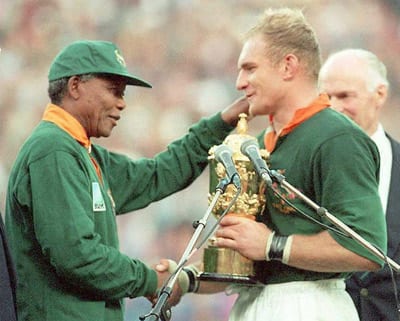As the Cold War was ending, Professor Joe Nye at Harvard introduced the concept of soft power, the ability to attract and persuade through shared interests, culture, ideals, legitimacy and credibility. Nelson Mandela was the personification of soft power, a one-man pubic diplomacy force of nature.
Mandela relentlessly pursued peace and reconciliation, had a keen understanding of his personal power of example and was not afraid to use it. As former President Bill Clinton said of Mandela at a peace conference on Burundi in Arusha, Tanzania in August 2000, “He knows there is no guarantee of success, but if you don’t try, there is a guarantee of failure. And failure is not an acceptable option.”
It was there that I had my one up close and personal view of Nelson Mandela in action. After several months of painstaking negotiations among the various Hutu and Tutsi factions waging a civil war in Burundi, Mandela cajoled the leaders of 20 countries – presidents, prime ministers, foreign ministers and other emissaries – to assemble in Tanzania and convince Burundi’s warring parties to sign a framework agreement that would establish a ceasefire, political dialogue and eventually an inclusive transitional government.
Months earlier, Mandela asked Clinton to be the “closer” at Arusha, taking advantage of his experience gained through the Dayton Accords in Bosnia, Good Friday Agreement in Ireland, and the Middle East Peace Process. Clinton willingly agreed, and once there, it was easy to see how and why Mandela was so effective.
Immediately upon arrival, Mandela briefed Clinton on the state of play. The conference was deliberately constructed to create a deadline – that day – to exert maximum pressure on the parties to compromise. Most factions were on board, but not all.
While the national security staff huddled to build a game plan to recommend to the president, Mandela grabbed Clinton, bolted out a side door and simply went to work. No script, just two great political players working around the scrum and judging based on experience and instinct how to advance the ball down the pitch.
At the end of the day, an agreement was reached, although tragically, the civil war would drag on for another few years. But the eventual resolution followed the framework that Mandela, with Clinton as his wing, put together in Arusha.
In his formal remarks to the conference, President Clinton called Mandela a “force for peace” but stressed that even Mandela could not impose a solution on the combatants in Burundi. They had to choose peace.
Then he reflected on the historic choice Mandela had made, relating a question he had posed years earlier. “When they let you out of jail the last time and you were walking to freedom, didn’t you have a moment when you were really, really angry at them again?
“You know what he said,” the president continued. “He said, yes, I did – a moment. Then, I realized I had been in prison for 27 years, and if I hated them after I got out, I would still be their prisoner, and I wanted to be free.”
The world is diminished by Mandela’s death, but we still have the power of his example.


